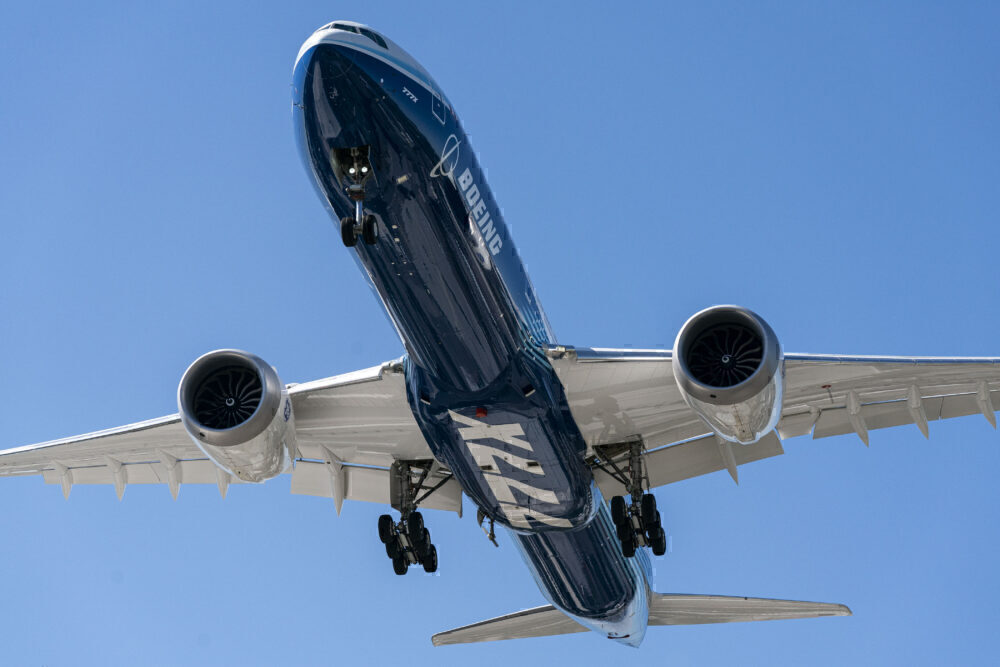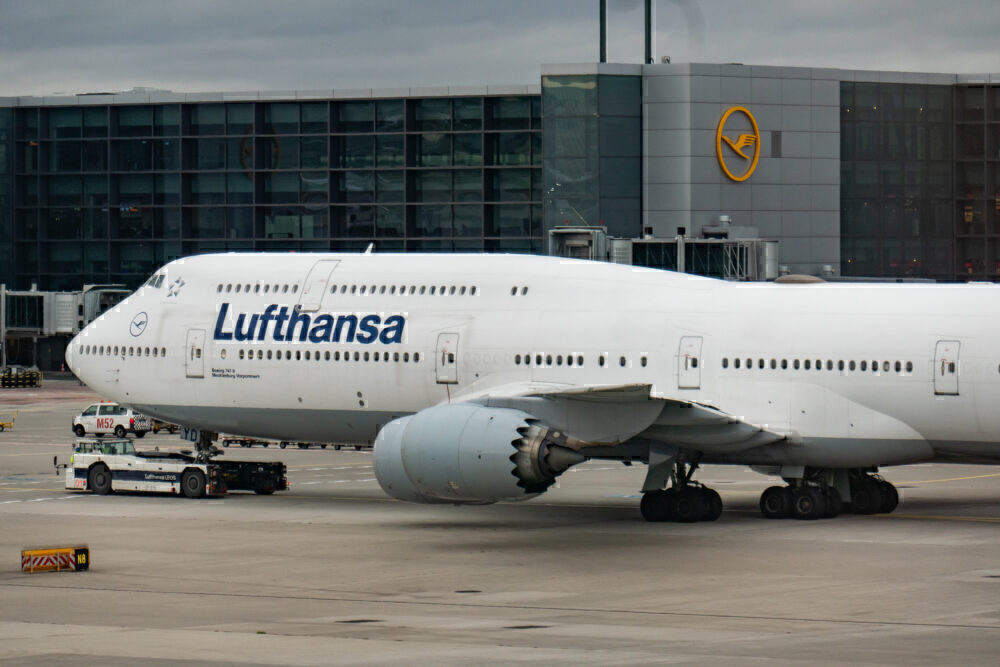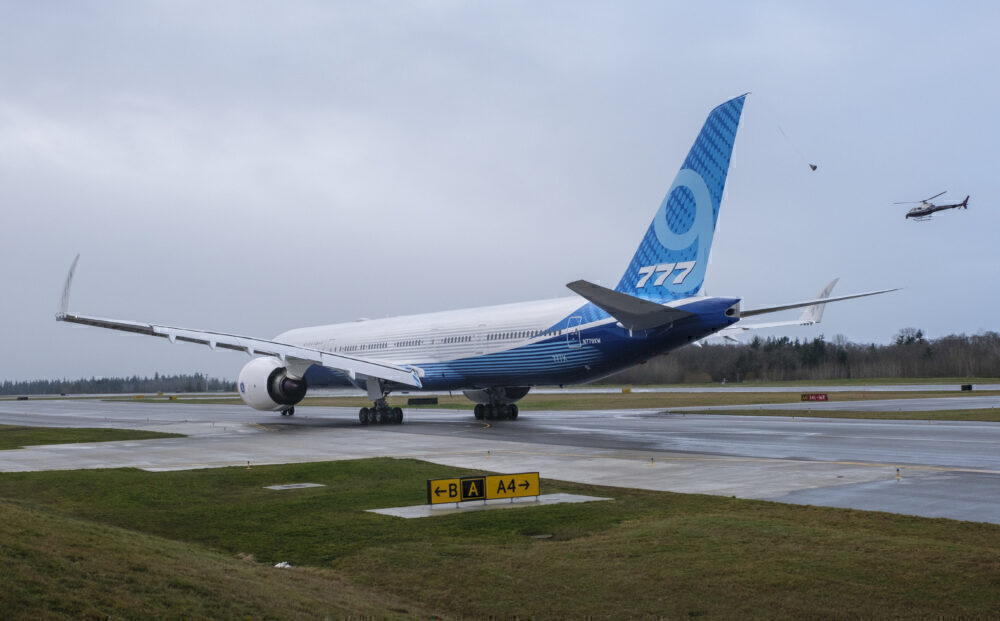The upcoming Boeing 777X promises a lot for both airlines and passengers. The largest engines to date, the highest capacity of a twinjet ever, and improved efficiency over the 777 and, of course, any quadjet. The larger 777-9 takes over from the Boeing 747, offering almost the same capacity, with a longer fuselage and wider wingspan.

Launching the 777X
Before we compare the size, it’s worth a quick look at where the 777X came from. It is the continuation of the popular Boeing 777 series but also has a close relationship with Boeing’s other widebodies. The 747 is now, of course, out of production, but the 777X is targeted as a replacement. And although it does not feature the clean-sheet design of the 787, it takes on many of its improvements and avionics and will have a similar cockpit to aid pilot commonality.
The Boeing 777 has been the best-selling widebody aircraft to date. It was launched in 1994 and has moved through several variants since then. The 777X continues this story. It offers many improvements but keeps the same base design and metal fuselage construction as the 777. The internal fuselage space is increased slightly, though, by using thinner walls and more efficient insulation.
The Boeing 787 and Airbus A350 were developed to take on-demand for more efficient widebodies, using a new clean-sheet composite construction. To offer the size (and cost) needed, the 777X builds on the success of the 777 but will still offer efficiency improvements through its engines and wing design.

Passenger capacity
To see how the 777X offers an alternative to the 747, just look at the passenger capacities. There will be two versions of the 777X, the larger 777-9 and the smaller 777-8. The 777-9 (the first to launch) offers a capacity of up to 426 (in a two-class configuration, according to Boeing data). The smaller 777-8 will offer a capacity of around 384 and closely competes with the A350-1000.
The 777-9 sits well alongside the 747. The newer (and larger) 747-8 has a typical capacity of 410, according to Boeing (this is in a three-class configuration). It is rated to a maximum of 563, however. Lufthansa operates the 747-8 in a four-class configuration with 364 seats, Korean Air and Air China slightly more. We will have to wait and see exactly what layouts the 777-9 takes, but it will be close to the 747-8.

The 777X is a longer aircraft – just
According to Boeing’s data, the 777-9 has a total length of 251 feet 9 inches (76.72 meters). The 747-8 is just a bit smaller at 250 feet 2 inches (76.3 meters).
The 777-9 is the longest commercial aircraft ever built. The A380, of course, retains the title for the largest (by passenger capacity, volume, and weight), although at 238 feet 7 inches (72.72 meters), it is a full four meters shorter.

Stay informed: Sign up for our daily and weekly aviation news digests.
The 777X beats the 747 for wingspan and engine size
Length isn’t everything, but the 777X does well in other categories too. The wingspan is undoubtedly one of the more interesting. The 747-8 has a total wingspan of 224 feet 5 inches (68.4 meters). The A380 took this even further with its huge 261 feet 8 inches (79.75 meters) wingspan. This has given it significant limitations in operations, though. By placing the aircraft in the highest rating category, it can only operate at the largest airports.

The 777X will get around this category limitation with folding wingtips. When extended, the wingspan is 235 feet 5 inches (71.75 meters). On the ground, the wingtips fold to reduce this to 212 feet 8 inches (64.82 meters). This gives the aircraft the efficient operation it needs in the air but enables it to operate from much more locations.

As anyone following the 777X development and launch knows, the engines are another standout feature. The newly developed GE9X engine is the largest commercial jet engine to date – but not the most powerful. These have a larger diameter fan with fewer blades (16 instead of 22), use of lighter carbon fiber composite materials, and a higher bypass ratio (offering better propulsion efficiency). Together with the increased lift from the extended wings, this will deliver significant efficiency improvements.

Perfect replacement for the 747
However it compares, the 777-9 s set to be a suitable replacement for retiring 747s for many airlines. It may fall short of the 747s maximum capacity potential and certainly is lower capacity than the A380, but it will fit the high capacity, long-range point-to-point, and also efficiency needs of many airlines well.
The former International Airlines Group CEO Willie Walsh explained this well when discussing British Airways’ 777X order. He said:
“The new B777-9 is the world’s most fuel-efficient long-haul aircraft and will bring many benefits to British Airways’ fleet. It’s the ideal replacement for the Boeing 747, and its size and range will be an excellent fit for the airline’s existing network. This aircraft will provide further cost efficiencies and environmental benefits with fuel cost per seat improvements of 30 per cent compared to the Boeing 747.”
We are very excited about the launch of the 777X and its hopeful certification by the end of 2023. Are you looking forward to getting onboard the longest twinjet ever – or do you prefer the spaciousness of two decks? Feel free to share your thoughts in the comments.
from Simple Flying https://ift.tt/3FOHl2C
via IFTTT
Comments
Post a Comment